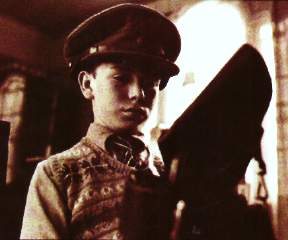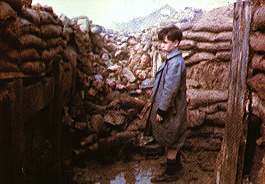|
Heroes for Ghosts The Wall: A Father Quest by Dave Ward
Several years ago, in a piece titled The Wall: An Unheroic Journey I examined The Wall as a myth-like epic. In The Wall, Pink is an anti-hero, doing the opposite of what a mythic hero should do. In this way, he serves as a negative example, showing some of the mistakes we should not make in life. Despite this, his life parallels the typical outline of a heroic life. One element Pink has in common with a typical hero is the 'father quest.' In traditional myths, the hero typically has no father, does not know his father, or is otherwise alienated from his father. The hero goes on a quest for his father, intentionally or not, and is ultimately fulfilled when he meets his father or makes contact with him in another way. In Celtic legend, Peredur (also known as Percival or Parzifal) who ultimately finds The Grail, is raised by his mother, unaware that his father was a great knight who died in battle. Likewise Tristan, legendary lover of Isolde, did not know his father, who was also a great knight who died at war. Other myths around the world take this separation from the father to a different level in which the hero's father is a god. In Greek myths, Zeus fathered many heroes, intervening in their lives only rarely. In the Christian mythos, Christ was conceived by God. The standard mythic ideas about fatherhood are found even in 'new myths' such as the Star Wars movies, in which it is suggested in Episode I that Anakin Skywalker was conceived by The Force itself. Later, in Episode IV, young Luke Skywalker sets out not only to fight the Empire, but also to learn more about his father, who he is told is a great Jedi knight who died in battle. Like Luke in Star Wars, Pink in The Wall is an excellent modern example of the mythic father quest. Pink's father (like Roger Waters' own father) is killed at Anzio in World War II. Pink is born back in England while his father is still at war. So, with his father killed in war, Pink never has the opportunity to know his father.
As a small child, Pink plays innocently with a toy airplane, apparently unaware that a similar plane killed his father. It would be a few more years before Pink would begin to understand how his father's absence is affecting him. As a small child, he wanders the playground, attaching himself to another child’s father, barely seeming to understand that there’s something important missing from his life that other children seem to have. As a boy of about twelve or fourteen, Pink finds mementos of his father stored in a drawer in his mother's bedroom. There he finds some bullets, his father's military uniform, and the letter informing his mother of her husband's death. This is told in the song 'When the Tigers Broke Free':
Pink puts on his father's military jacket and hat, and looks at himself in the mirror. He sees his father in himself. It is an important moment for Pink, as he is briefly connected with his father. It is the moment which sends him on a metaphorical father quest, seeking to understand his father, but also himself.
But implicit in the scene is also the fact that thousands of other boys like Pink--and Waters--also lost their own father in World War II. Unfortunately, Pink's experience of growing up fatherless is a common experience throughout time. Pink continues his father quest at the British docks where soldiers are returning from the war. He searches for his own father, but he is not to be found; his father will not be returning home. This poignant scene in the film is accompanied by the song "Vera Lynn", in which Vera Lynn's promise that 'we'll meet again' is compared to a broken promise that his father might return safely from the war. An important part of the growth of a hero is that he achieves an atonement with his father. The hero either meets his father, or gains a special understanding of his father that helps to heal the wound of the absence. A true hero is able to draw strength from understanding his own suffering. Odin gained wisdom by hanging from a tree for nine nights. Christ was transformed and empowered after suffering for three nights on a cross on Calvary. In everyday life, we all are made stronger by understanding the things that hurt us. That is, after all, the only way to truly heal an inner wound. Pink, however, is an anti-hero. He does all the wrong things, and never learns the lessons that a true hero should have learned. After his own father quest, Pink goes on to build his wall. Instead of learning from his father's absence and becoming stronger, Pink turns his father's absence into 'just another brick in the wall' that blocks in his emotions and keeps others from getting close to him. Sadly, Pink's father quest cannot possibly ever lead him to meet his father. And unfortunately, it is not made entirely clear to us whether Pink ever comes to understand his father, or heal the void left by his absent father. At the end of The Wall, the wall around Pink is torn down. We are never told whether Pink is able to draw wisdom or strength from his suffering. We can only imagine whether the collapse of The Wall ultimately symbolizes Pink's destruction, or whether it is his salvation. Roger Waters himself has grown over time, but the pain of his father's death and absence has never gone away entirely. Even in his 1998 song "Lost Boys Calling", Waters alludes to his father's absence in the line, 'You never took us fishing, Dad, and now you never will.' Perhaps it's suitable that we are not given a clear sign of what is to become of Pink after his psychological wall comes down. After all, it is up to each of us to observe Pink's mistakes and learn from them. Ultimately what happens to Pink after the wall is gone is irrelevent; the only thing that matters is what we each learn from it--whether it empowers us... or merely entertains and disturbs us.
Dave Ward, former editor of The Steel Breeze Pink Floyd news service, is an avid student of mythology and rituals. |

